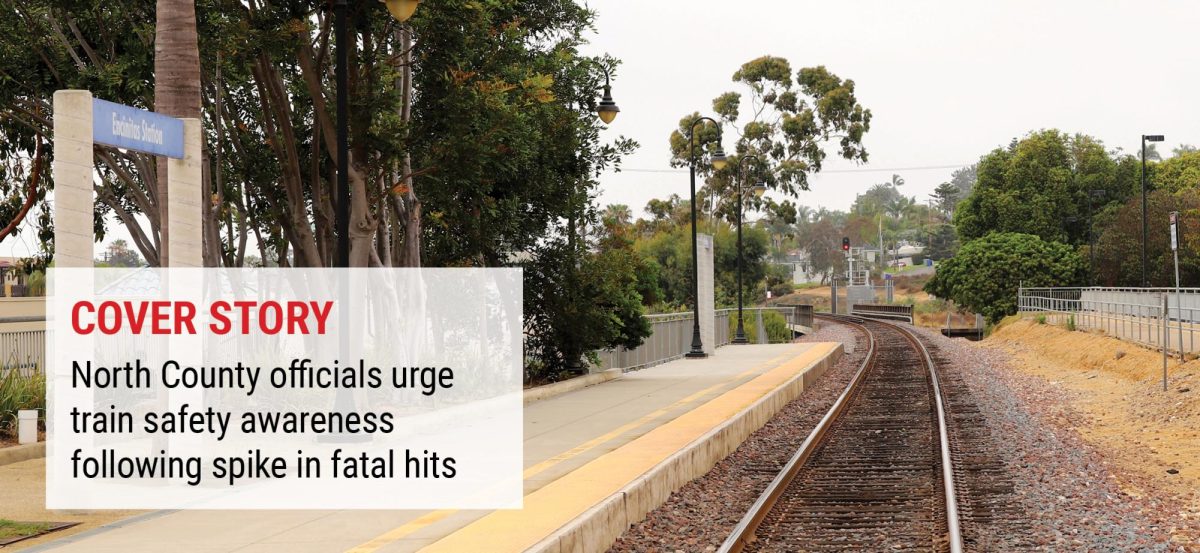A recent uptick in fatal train collisions in San Diego County is raising alarm bells for city and law enforcement officials. The number of deadly incidents along the rails has spiked this year, renewing concerns over access to mental health services for people at risk of suicide.
In the first three months of 2024, there were 10 fatal collisions in San Diego County. Eight of these were on the stretch of coastal tracks from Del Mar up to Oceanside. Four of them were in Encinitas and Carlsbad. For comparison, there were a total of 12 fatal collisions in 2023, according to data from the North County Transit District.
“These are tragic events that not only impact families and communities, but also the mental health of railroad employees, passengers, first responders, and others,” NCTD wrote in a statement.
In response to recent collisions, the LOSSAN Rail Corridor, an agency that monitors a 351-mile stretch of track from San Diego to San Luis Obispo, announced Operation Safe Surfs last August.
The initiative seeks to raise awareness of railroad safety in several key ways. First, the agency produces rail safety public service announcements, which are advertised across television and radio. Second, the agency helps organize volunteer groups to reach out to homeless populations along railways and offer safety information along with care packages of some essential items.
“We are wanting to engage with nonprofit agencies throughout the corridor to reach out to the nonhoused communities in proximity to the railroad tracks to really promote railroad safety,” LOSSAN Managing Director Jason Jewell said.
Outreach to homeless communities is particularly important when it comes to train safety.
Sheriff’s Transit Enforcement Unit Sgt. Jason King said his team is periodically contracted by NCTD to clear out homeless encampments along the tracks.
“They (NCTD) report back to my unit if they come across encampments that are on NCTD property or close to the tracks, and my unit goes out and clears those,” King said.
The clearing of encampments, however, often does not alleviate the risk along the tracks.
Stephanie Rosenfeld, therapist and founder of Clear Mind Counseling San Diego, said the suspicion of professional help within homeless communities makes it difficult to get people the help they need.
“I think there is some suspicion there and some ambivalence about going and getting the treatment,” Rosenfeld said. “You don’t want to get in trouble, you don’t want to say something that’s going to cause more harm to you in terms of maybe having police involvement.”
Encinitas Mayor Tony Kranz acknowledged the difficult task of getting people in crisis the help they need with the city’s current mental health infrastructure.
“Sheriff’s deputies have some basic training in how to deal with people in mental health crises, but it’s nothing that they have significant training in,” Kranz said. “We do now have social workers that are helping with the homeless, but social workers aren’t necessarily trained to deal with mental health crises.”
Kranz pointed to the San Diego County-funded Psychiatric Emergency Response Team as an option for people who know of a loved one in crisis.
“If an individual is experiencing a mental health breakdown, family or friends can call the PERT team, which will respond with people who are trained in how to manage mental health breakdowns,” Kranz said.
In addition to the mental health resources currently available, officials are focused on posting more signage around rail lines with support numbers for people in crisis.
“NCTD a few years ago put up suicide hotline numbers along the railroad tracks in certain areas to help mitigate that,” King said. “The idea was that you would see the sign if that’s what you’re thinking and maybe make that phone call.”
Despite the safety precautions around crossing zones, fatal train collisions are still rising this year. King said he thinks this is in part because people don’t realize the true danger posed by trains.
“They can’t drive out of the way, they can’t swerve to miss you. People don’t realize, I think, how dangerous they are,” King said. “These trains move quietly. If you’re from the Encinitas area, you probably have noticed a huge change in how these trains are, from the older ones that were fairly loud … but now with these new engines that have come out … they’re a lot quieter than they used to be.”
NCTD also emphasized extra awareness around train tracks.
“We urge the public to stay clear of the rail line, cross only at designated areas, and always expect a train to come when you see the tracks,” NCTD wrote in a statement. “Trains are bigger, faster, and quieter than you think.”
The impact of recent train safety awareness campaigns is yet to be seen. For now, mental health professionals are urging local municipalities to invest in preventative care to reduce the number of suicides by train. This includes better screening for anxiety and depression during annual physicals.
“There’s a tendency with M.D.s to kind of breeze over that, or just very superficially check in with how people are feeling emotionally,” Rosenfeld said. “(But) I’m happy that over the last few years, especially since the pandemic, mental health services are way more visible than they ever have been.”
If you or someone you know is in immediate crisis, call the San Diego Access and Crisis Line at 1-888-724-7240, 24 hours a day, seven days a week.
Patrick Doyle is a local freelance writer.




